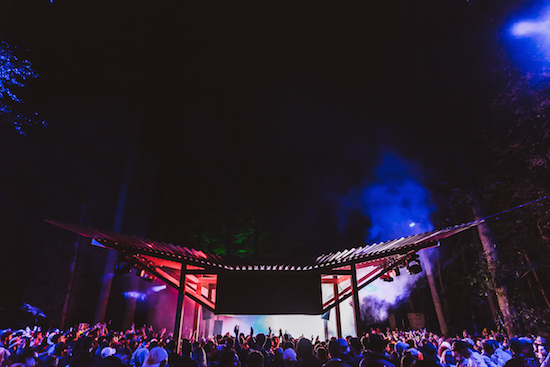Some hours into the second day of this year’s Houghton festival, a group of friends rocked up at The Clearing stage dressed in orange and gold and rolled out a red carpet, two of them guarding its entrance with a makeshift red rope. They then proceeded to hand out wristbands granting entry to a fake VIP area, set up amongst the trees near the stage, complete with inflatable couch. It was one of numerous gloriously silly moments over the weekend that proved that Houghton attracts a clued-up crowd that doesn’t take itself too seriously.
This became particularly evident as Saturday turned into Sunday at the festival this year. Many of those still standing on Sunday morning had very likely not slept for a sizeable number of hours and it’s at this point that things really began to loosen up, everyone giving themselves over to the delights – and minimal phone reception – that the festival and its location had to offer. This is thanks to the 24-hour license that cemented Houghton as the UK’s best new festival last year, and saw it continue to mark the weekend out this year too. It’s thanks to this relatively generous license – a rarity in the UK – that Houghton can continue to stand out from most other festivals by giving those booked to play extended set times, something that shouldn’t be understated in an era in which line-ups are becoming increasingly overbooked and set times are getting increasingly shorter. Many of those on this year’s line-up played for three hours or more. Some were also given the opportunity to play multiple sets across the site, allowing them to showcase different sounds and take different approaches according to the stage or time that they were playing.
The team behind Houghton – which involves the organisers of Wales’ Gottwood festival and head curator Craig Richards who played multiple times over the weekend – didn’t mess with the formula too much this year. That’s not overly surprising though given the success of last year’s debut edition. Many of those who played last year’s festival returned with the line-up leaning towards various British favourites – Ben UFO, Pearson Sound, Joy Orbison, Call Super and more – and the minimal and electro-favouring DJs – such as Ricardo Villalobos, Nicolas Lutz and Margaret Dygas – with whom Craig Richards regularly plays at fabric, where he is a resident. Richards also once again put his stamp on the site through large pieces of artwork – bearing his distinctive style – which adorned the stages and corners of the festival’s main arena. A number of live acts also filled the bill, with the likes of Burnt Friedman, Monolake and Mulatu Astatke all making an appearance and offering something slightly different musically.
As ever, the location was key to helping Houghton stand out, and in the grounds of Norfolk’s Houghton Hall, organisers have a very special site, particularly with the woods and lake that a few of the festival’s stages are dotted around. Revellers could also once again take in various extra-curricular activities away from the music, including round-the-clock sculpture tours of the grounds, yoga and life drawing. One new addition this year was Trevino’s, the on-site record shop selling stock from a number of acts and labels connected in some way to Richards. Here, a number of DJs also played second sets in slightly more intimate surroundings. Trevino’s, named after an alias of the late Marcus Intalex, was one of four new stages this year. Stallions was a small dome centred around reggae, dub and less ‘banging’ sounds while Tantrum centred around electro (DMX Krew, Claro Intelecto, Intergalactic Gary) and drum and bass (dBridge, Calibre, Doc Scott).
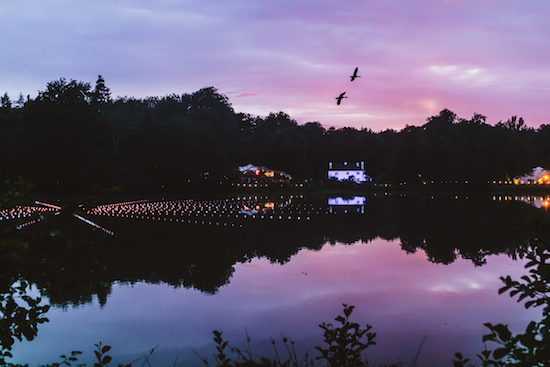
Perhaps the best addition though was The Clearing. Set up as a 360-degree experience of sorts – with the DJ booth in the round – it played host to some of the best sets of the weekend and never got uncomfortably busy, making it a very attractive prospect just to lock in to for the full day and see where each new DJ took you. Friday’s line-up at The Clearing threw up numerous highlights, opening firstly with the smooth-edged, bumping house of Birmingham’s Jayson Wynters. His selections flowed gracefully, each tight blend pulled off effortlessly and rewarded with the best sound set-up that this year’s festival had to offer. OMAR, the Uruguayan cohort of DJs such as Nicolas Lutz and Binh, followed. His three hours in the booth saw him glide through zippy, bass-heavy minimal and electro cuts, alongside the occasional burst of old UK breaks, setting things up nicely for Voigtmann, one of the founders of leading London minimal night Toi Toi. He worked with a similar formula to OMAR, also finding time for oddball garage house with a heavy emphasis on low-end basslines. His three hours came to a head with UK garage classic ’138 Trek’ by DJ Zinc as nightfall began creeping into the woods in which The Clearing was housed. Binh’s set of warped, bleep-y house and techno cuts continued the fine run, the German DJ digging deep as ever while also re-contextualising recent tracks from UK labels such as Hot Haus (Innershades’ ‘Inside Your Mind’) and Dixon Avenue Basement Jams (Big Miz’ ‘The Great Beast’).
The following day, Saoirse, originally scheduled to play on her own, played the second of three scheduled sets across the weekend, inviting Shanti Celeste along for an impromptu back-to-back. Trading off on UK-rooted house and garage (Nu Birth’s classic ‘Anytime’ was a particular highlight), they helped get the growing audience back into the swing of things at the weekend’s midpoint before Pearson Sound took over for three hours. The Hessle Audio co-founder used his slot to pair the ’90s garage house that you might hear from many others on the Houghton line-up with the UK sounds he, and his peers, are such keen champions of. Moving through a selection of lighter house cuts, heavy on melodies and vocals, in his first hour, he soon found room for more percussive and break-led contemporary cuts such as Ploy’s excellent Timedance-released ‘Ramos’, Galtier’s hard drum workout ‘Koll’ and recent Skee Mask album track ’50 Euro To Break Boost’. UK garage, such as DJ Abstract’s ‘Touch’, also stood out in a set that built brilliantly. Ivan Smagghe and Vladimir Ivkovic, by now seasoned back-to-back partners, were handed control of six hours of The Clearing’s programming on the final day, closing proceedings. Dipping in and out over the course of the set, it seems that the tempo barely surpassed the 110-BPM mark, the pair proving that speed doesn’t have to be the primary factor in building intensity over the course of a set. Much of what they played was unrecognisable to my ears, but the acidic, druggy melodies – much of them likely from obscure goa trance records played at 33rpm – you can except to frequently hear from the pair were on full display.
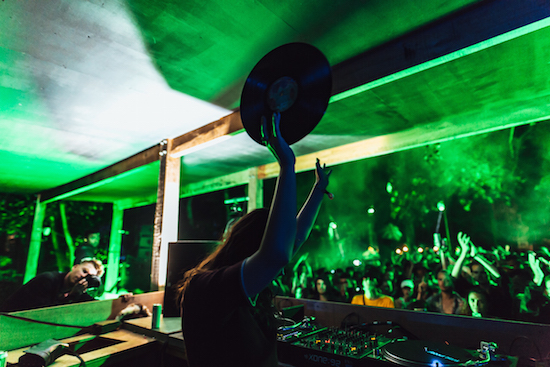
The Quarry, a hollowed-out area in one corner of the site, returned for 2018 with a slightly different set-up, the booth this time raised on one of the slopes that surround the dancefloor rather than centred at the bottom of the descending floor as was the case last year. On Saturday night, Saoirse played her last of three sets, her selections centred heavily around breaks-heavy garage. One of the standout sets of the weekend, she made heavy use of the mixer, chopping between tracks and teasing the occasional drum loop from what would follow next. It’s easy to overdo this kind of mixing in the wrong hands, but each pairing would lock so nicely together that you would think the two tracks had been made just to be played together.
Another DJ who favours this approach to their sets is Call Super. He played the same stage later that night, amidst some of the worst weather thrown at revellers over the weekend, the rain lashing down for much of the first half of his set. Of all the stages on site, The Quarry was most open to bad weather so you couldn’t blame people for taking cover. The DJ rewarded those who braved the rain and mud with a set that balanced known favourites with driving techno and UK garage. “It’s always a fun challenge to work out how to turn something that starts off an endurance test into something that goes beyond the conditions and rewards the most dedicated of dancers,” he said of the set on Instagram earlier this week. Kicks Like A Mule’s remix of Awesome 3’s 1992 rave classic ‘Don’t Go’ drew a particularly strong response while he also found time for Jeff Mills’ ‘The Bells’ in the final hour, teasing, chopping and doubling up the beats in a way that showed you can still bring out something original from playing probably the most well-known techno tune there is. 2-step UK garage also made a prominent appearance as he shifted from Smokin’ Cheeba’s ‘When I Was A Youth’ to Jaybee’s ‘Mysterious’ while more forceful techno by Minimum Syndicat and Amotik offset the rave-y piano chords that lit up much of his other selections.
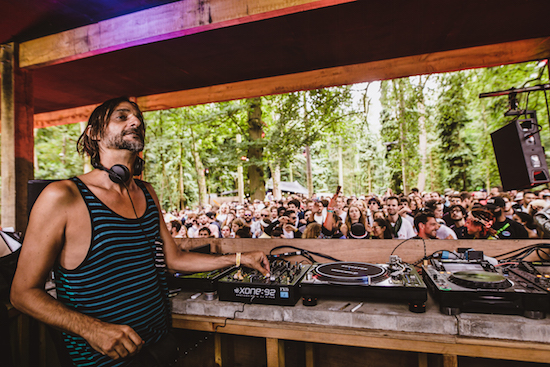
Last year’s secret stage, the Terminus, also returned for 2018. With many having discovered the area last year or at least discussed its whereabouts online since, it wasn’t so much a secret this year. Organisers opted to leave the set times for the stage off the programme but this did nothing to quell its popularity meaning that queues were an unfortunate constant over the weekend. After a failed attempt to get into the area on Sunday morning, I found myself instead at The Old Gramophone, a small tent positioned in the middle of the main food court. The 24-hour license clearly taking its toll on many of those still going, some opted to sit on the sofas dotted around the tent or simply take up a light sway as Margaret Dygas rolled out classy house cuts (Omar-S’ Thank U 4 Letting Me Be Myself’, Mike Dehnert’s ‘How Close To Be’) alongside some gorgeous UK garage. Many of those who’d played elsewhere earlier in the night – Ricardo Villalobos, Zip, Sonja Moonear – could be seen taking in her set just behind the booth. Almost two hours in, the power cut. Remaining patient, Dygas returned a short while later to continue before the power cut again putting a premature end to a set primed for the hardened Sunday morning dancers.
It should be said that there is room for improvement at Houghton. The organisers have been open about how pivotal the bar take is to them balancing the books, but drinks were generally quite expensive. The only water that could be purchased from the bars came in 200ml cans priced at £2 though to Houghton’s credit, there were a number of water points dotted around the site. The toilets also weren’t cleaned for a number of days – seemingly not at all from Friday through until the end of the weekend. I’ll spare you the gory details of what sights greeted those brave enough to go into the portaloos on Sunday night.
Perhaps the biggest shame was the variable soundsystems at some points over the weekend, particularly as they were so reliable last year. Call Super’s set at The Quarry, though a highlight of the weekend, was let down slightly by the sound which failed to fill the dancefloor unless you were lucky enough to muscle your way to the sweet spot close to the front. The Pavilion, situated in the woods and overlooking the lake, was most affected though. Ricardo Villalobos, playing there in the very early hours of Sunday morning, went abstract. The sound didn’t quite do justice to his set which was punctuated by gurgling bass rumbles and the most stripped-back of minimal techno. With such subtle music, crystal clear sound that fills the area – which is one where most of the weekend’s headliners played – is required. Speaking anecdotally, there appeared to be a split between those near the front (who spoke almost evangelically about the set) and those elsewhere (who weren’t quite so enamoured).
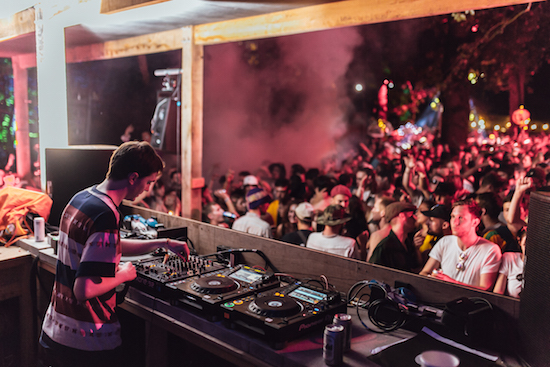
This was a similar case for Joy Orbison and Ben UFO on the final day who, despite playing excellently as ever, were let down by the sound distribution. It’s been suggested that this may be down to noise restrictions as a result of complaints from locals, a factor which is unfortunately very possible. With the site being such a perfect setting for Houghton, it’s hard to see a way around this issue but it’s a shame nonetheless. Having found a spot close to the front for Ben UFO’s final hour and the three-hour musical assault from Helena Hauff that followed him to close the weekend, it was clear just how dependent your enjoyment of sets at The Pavilion was on your proximity to the few sweet spots for sound. Hauff opted for bumping electro and ghettotech across the first half of her three-hour set before shifting to a selection of unrelenting acid and techno, including Fixmer/Mccarthy’s, gnarly EBM-edged ‘Chemicals’. As a light rain began to fall – one of the only welcome instances of rainfall over the weekend – while Hauff drew for her final selections, the lighting combined with the smoke machines to create a green mist that descended on the dancefloor. Hauff played out her penultimate selection to the end before bowing out exquisitely on the serene electro of Galaxian’s ‘Mutual Arising’, released on her own Return To Disorder label – a moment that felt like coming up for air after the sheer intensity of everything that preceded it.
There’s one more niggling issue with Houghton though, and one that’s far more important than everything else in the wider context. Following the initial announcement of this year’s line-up, an edited poster soon began to circulate online highlighting the sheer lack of diversity. Only eight women, from 79 acts initially announced, had been booked. Some directly challenged the festival on the matter only to be told over email that this was just the first announcement and many more acts would follow. Another announcement came some months later and with it a handful of women and, once again, lots more men. Some have defended the lack of diversity in this sense as a reflection of Craig Richards’ curation, using the line that Houghton is simply a gathering of friends and affiliates of his from across the scene. While this approach to booking a festival line-up is somewhat admirable, and offers a more personal touch to the circuit festival booking policy of numerous others, it doesn’t actually reflect very well on him. Avoiding trotting out a reductive list of acts that could have been booked but weren’t, there were numerous DJs absent from the bill that fit the festival’s music policy to a tee – people who regularly play back-to-back or share bills with lots of those who did play, and who played numerous other European festivals this summer. I understand that we can’t say for sure who was and wasn’t available, but it’s hard to believe that a line-up with a representation of just over 10% of women couldn’t have been improved. Hopefully, next year will see action taken in this area as Houghton is a very special festival that is already getting so many of the other essentials right.
Below, you can find a playlist collecting tracks heard at Houghton this year, in sets from the likes of Call Super, Ben UFO, Helena Hauff, Optimo, Ricardo Villalobos and more.

